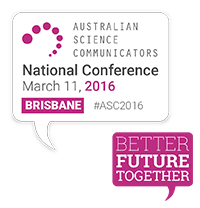Kelly Fielding is a Vice Chancellor’s research and teaching fellow at The University of Queensland. Her broad research focus is understanding environmental decision-making and how to communicate to increase knowledge and change attitudes and behavi our.
our.
Her research has identified ways to communicate to increase domestic water conservation, public place recycling, acceptance of recycled water and, more broadly, actions to reduce individual environmental impact. She is currently conducting research that seeks to understand the roots of rejection of science and how we might communicate to overcome these. She takes an interdisciplinary approach to her research and has worked with local council, State Government, and catchment management authorities to undertake this research.
We sat down with Kelly to find out more about her involvement in science communication.
ASC: How did you find yourself in science communication?
KF: It’s been a serendipitous route into science communication. It developed in the first instance from work I did about public perceptions of recycled water. I got to a stage where I realised we understood what the drivers of perceptions were, but now we needed to move to the next stage of developing effective communication about this water source. It’s also grown out of collaborations that I have with biophysical researchers. I’ve found that they are hungry for input on how they can more effectively communicate their findings and this has spurred my own interest in the area.
ASC: Why is communicating science important to you?
KF: My main motivation comes from my concern for the environment and our need to address the serious environmental issues that we currently face in Australia and around the world. We need to get more people interested and passionate about these issues and science communication is one route to this.
ASC: What challenges have you faced in talking about science?
KF: From a research perspective the challenges are the ones that research usually presents – what works and what doesn’t, how can we provide the evidence? For example, in relation to climate change – what are the most effective ways of framing the issue to get traction? Personally, the challenge for me is to sit back and listen more and try to find a way to connect with people’s underlying values and concerns.
Interested in hearing more from Kelly? She forms part of our ‘How can we understand and respond to people’s rejection of science?’ panel at the ASC Conference 2016.
